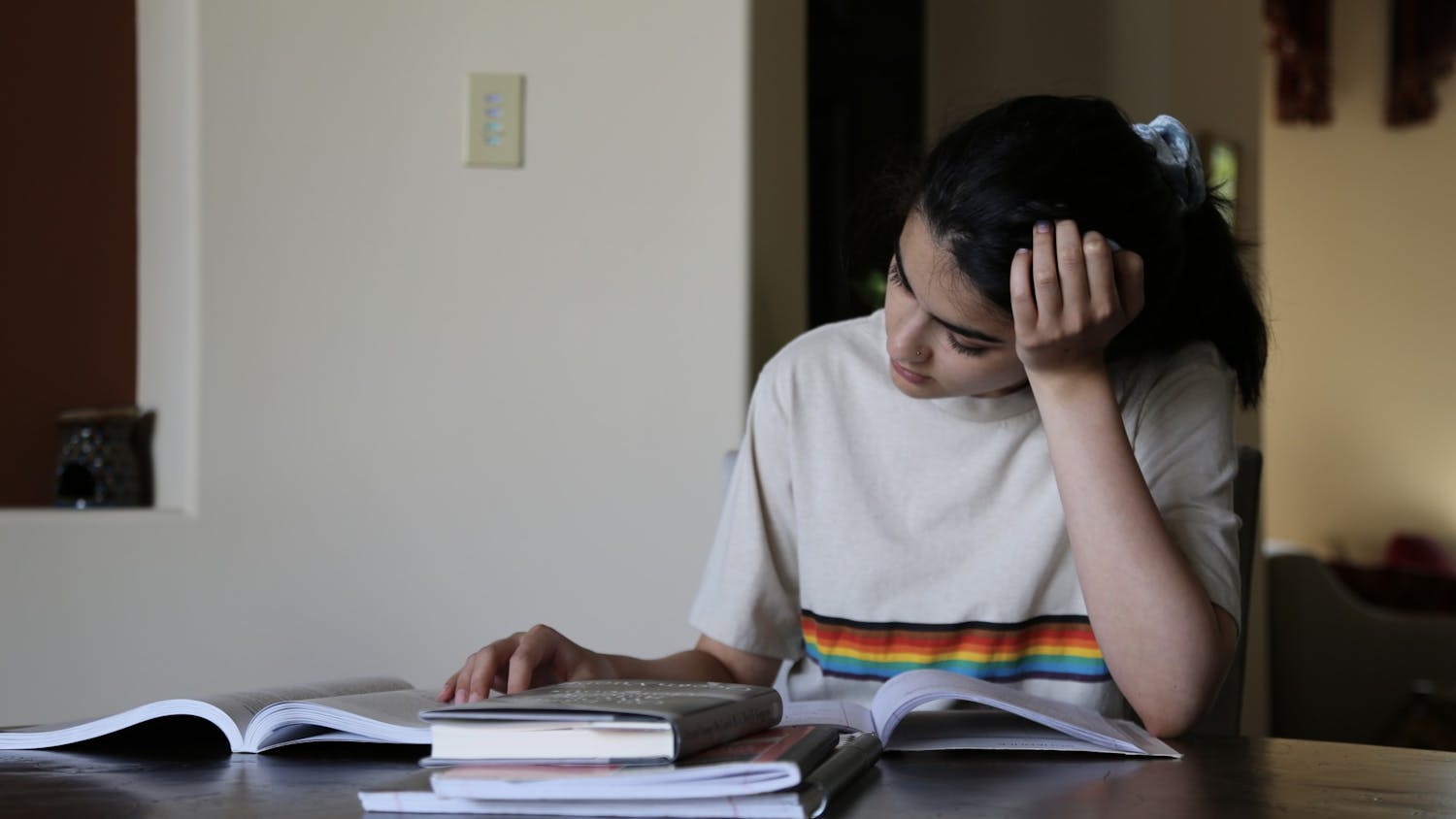During the past few weeks, Dartmouth students have had to adapt to several changes to spring term due to COVID-19, including a transition to remote learning and a switch to mandatory credit/no credit grading. At the start of spring term, The Dartmouth surveyed the student body on its opinions regarding the college administration’s response to the COVID-19 pandemic. The following article presents these results.
Students across all class years generally support the College’s response
Throughout the month of March, the Dartmouth administration introduced a series of decisions in response to the pandemic, including the cancellation of all off-campus programs in the spring and summer, the decision to suspend spring athletics, the transition of the entire spring term to a remote learning format and the limiting of public access to campus facilities.
The majority of Dartmouth students hold a positive view on the College’s response to the pandemic. About 60 percent of students are satisfied with the College’s response, while 40 percent are not. Notably, dissatisfaction was higher among the senior class than other class years, with 20 percent of the Class of 2020 indicating that they were “very dissatisfied” with the College’s response compared to an average of 11 percent across the other class years.
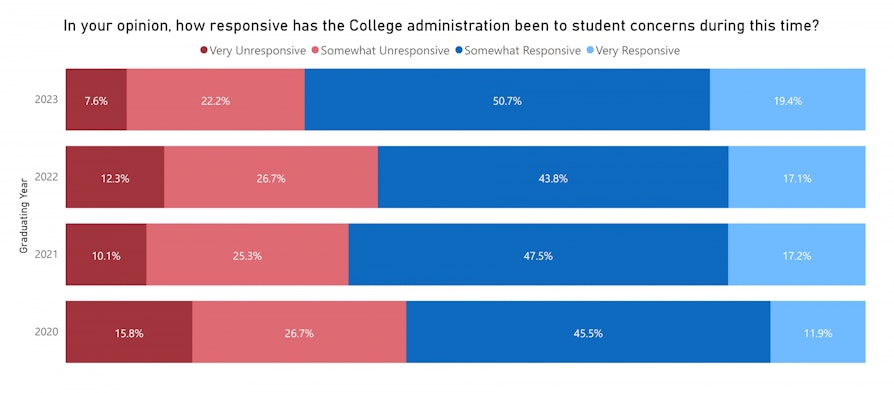
Students also hold a relatively positive view of the College administration’s responsiveness to student concerns, with over 60 percent of students across all class years indicating that the College was either “very responsive” or “somewhat responsive” to student concerns during the outbreak. Again, the graduating Class of 2020 holds the least positive view on the College’s response to student concerns, with an average of five percent more seniors believing the College was “very unresponsive” to student concerns compared to students from the other three classes. International students also held a more negative view of the administration’s response to student concerns. Though fewer international students viewed the College’s administration as “very unresponsive,” nearly 50 percent responded that the College was “somewhat unresponsive,” compared with 25 percent for domestic students.
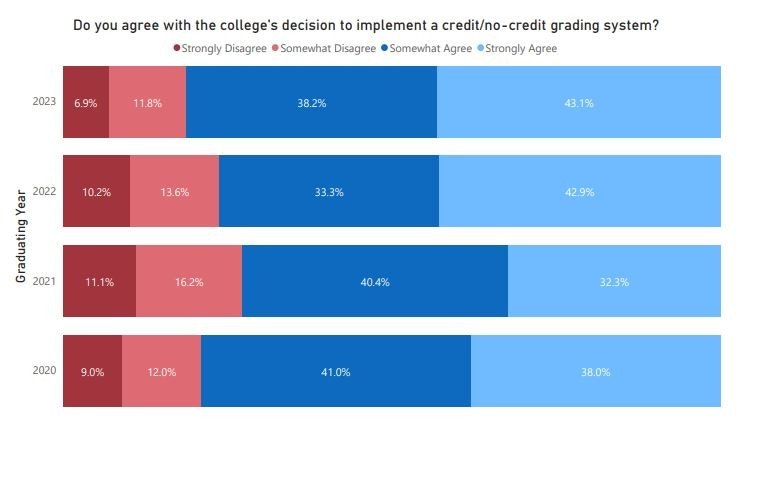
One of the most significant changes has been the College’s grading policy, which has moved to a mandatory credit/no credit system. Students across all class years overwhelmingly support the change in grading policy, with over 70 percent indicating that they “strongly agree” or “somewhat agree” with the decision to implement a credit/no credit system. However, opinions differed across class years, with 70 percent of the Class of 2023 agreeing with the policy compared to just 58 percent of the Class of 2020.
Students have had to adapt quickly
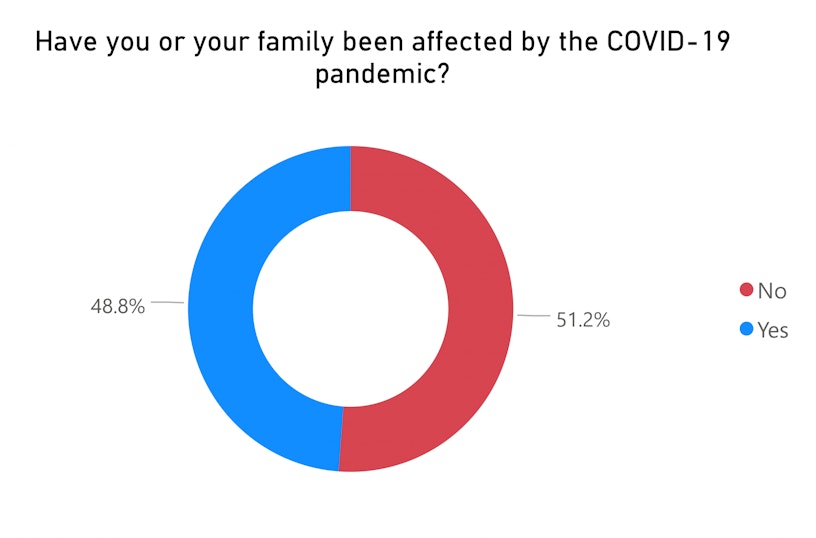
A significant percentage of the Dartmouth community has been affected by COVID-19 — 49 percent of students state that either they or their families have been affected by the pandemic through illness, financial or job security or other circumstances.
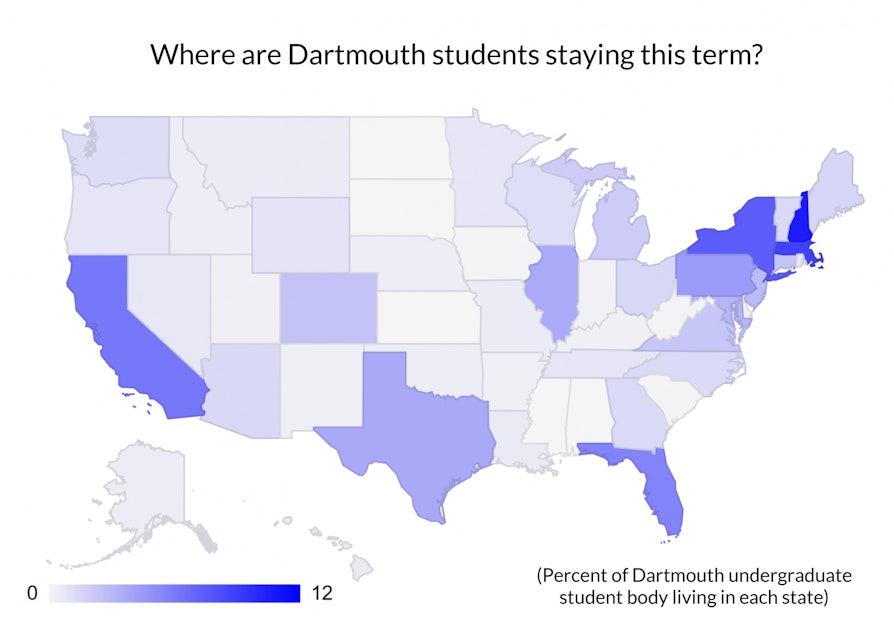
The majority of students will be residing in New Hampshire, Massachusetts, New York, California and Pennsylvania this term. Other students indicated that they would return home to countries including Canada, India, Brazil, Kenya and the Netherlands.
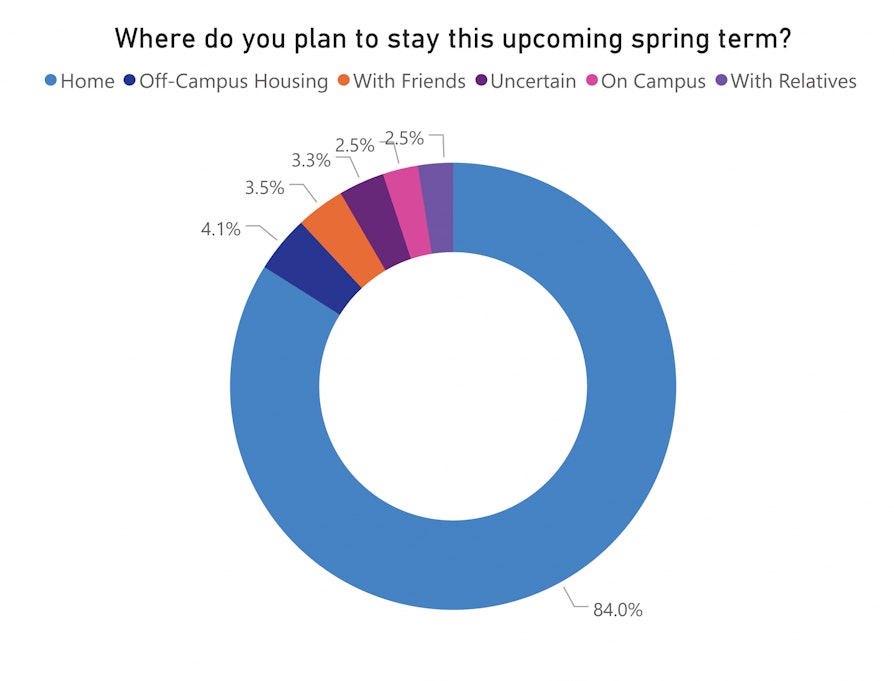
Over 80 percent of respondents will be staying at home this term, four percent will be in off-campus housing, 3.5 percent will be staying with friends and two percent with relatives. Three percent were still uncertain about where they would stay at the time of the survey. Residential plans for international students were not as clear — over 10 percent of international students indicated that they were “uncertain” about where they planned to stay for the spring term. Over six percent of international students will be staying with relatives.
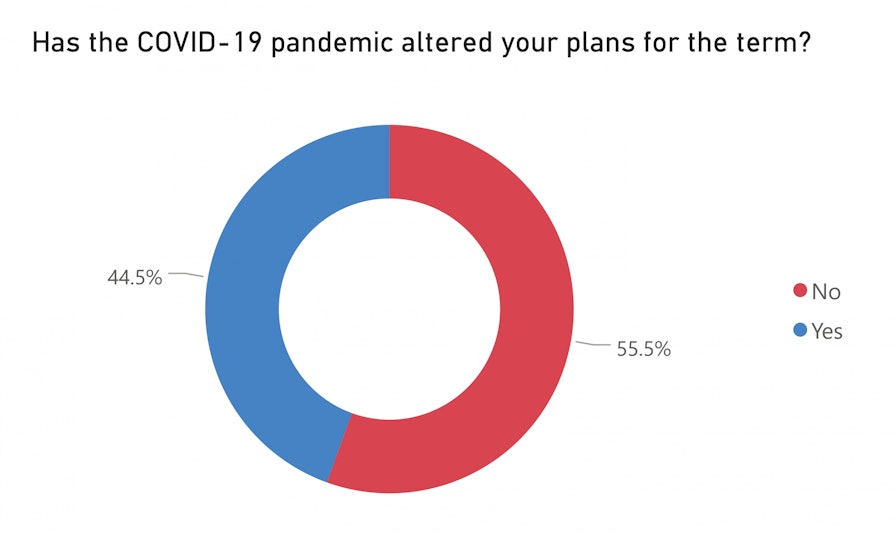
Dartmouth students have had to adapt quickly to rapid changes, and many have had to change their pre-existing plans. About 45 percent say that the pandemic has altered their plans for the spring term, whether through the cancellation of internships and study-abroad programs or changes in enrollment patterns. Just over 43 percent indicated that they were displaced from an on-campus job due to the shift to remote learning. Eighty-eight percent of students are taking courses this term, 3.5 percent have a full-time internship, 3.3 percent were still unsure and about one percent are doing full-time research. This statistic is consistent with usual spring enrollment patterns, in which typically more than 90 percent of the undergraduate body is in Hanover taking courses. About five percent of students were planning on studying abroad this spring, and had to change plans following the cancellation of all programs. The vast majority of this subgroup will now take courses instead.
Relationships and quality of learning are of high concern
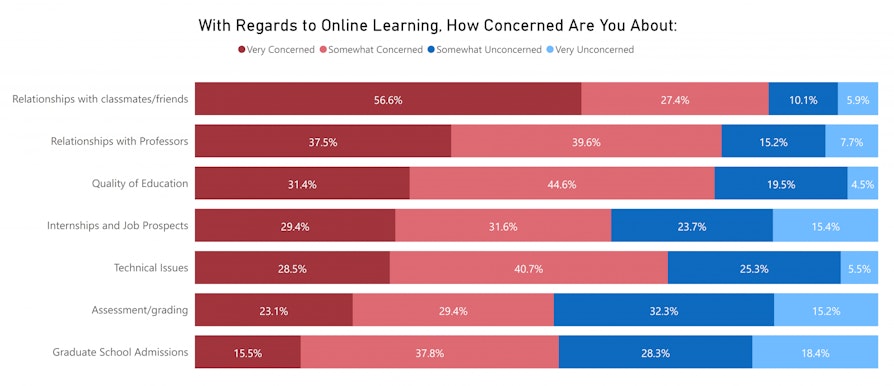
Dartmouth students report that this term, they are most concerned about establishing and maintaining relationships with their classmates and friends. Over 80 percent indicated that they were “very concerned” or “somewhat concerned” about relationships with their classmates and friends, and over 60 percent indicate similar concerns about establishing relationships with their professors.
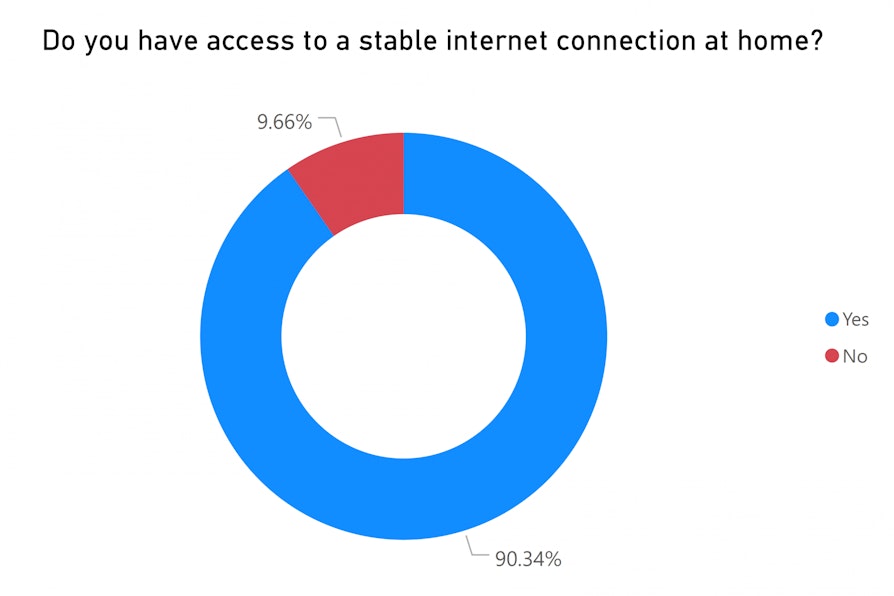
The next highest area of concern was in the quality of education. Though most courses are still being held in the online format, nearly 75 percent of students have doubts about whether remote learning will be as effective as the traditional Dartmouth experience. Students are also worried about the reliability of their technology. The vast majority of Dartmouth students have access to a stable internet connection at home, yet approximately nine percent still indicated they were concerned about their connectivity.
Students are less concerned about graduate school admissions, internship prospects and assessments. Over 40 percent are either “very unconcerned” or “somewhat unconcerned” about their job prospects, graduate school and grading.
Methodology Notes:
From March 31 to April 7, The Dartmouth fielded an online survey of Dartmouth undergraduate students asking their views on the College’s response to COVID-19 and their expectations about the spring term. The survey was sent out to 4655 students through their Dartmouth email addresses. Five hundred and fifteen responses were recorded, resulting in an 11.1 percent response rate. Using administrative data from the College’s Office of Institutional Research, responses were weighted by race/ethnicity, gender and graduation year. Weighting was done through iterative post-stratification (raking). Survey results have a margin of error +/- 4.1 percentage points.
Aaron Lee and William Chen contributed reporting.
Correction appended (April 18, 2020): A previous version of this article contained a graph with an incorrect number. The graph has been updated to reflect the correct information.

